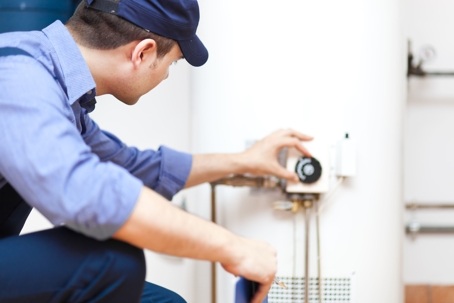It’s not uncommon for your water heater to make a certain amount of noise while it’s running. This is especially true at this time of the year, since your water heater has to work harder in winter to provide you with the warm water your house needs. Water heater sounds can be pretty innocuous, and may require no attention or action on your part. However, there are also some noises water heaters make that indicate a serious problem. Keep reading to learn about five common water heater sounds you may have noticed in your home, and remember that our expert technicians at Smith’s Plumbing Services are always available for your water heater needs.
5 Water Heater Sounds You Should Know
- Banging/Rumbling: Banging and rumbling are among the most common water heater sounds. Typically, these noises can be attributed to excess sediment build-up. When enough sediment accumulates in your water heater tank, it may react with the heating element to create those little mini-explosions you are hearing. This is usually a fairly simple problem to solve, and can usually be taken care of simply by draining your water heater tank—something you should be doing once or twice annually (assuming you do not have a tankless system, of course.) It is also possible your unit is experiencing a phenomenon called water hammer, which occurs when your water supply is turned off and then water suddenly floods back through the pipes. Water hammer can cause pipes to burst, so you may want to adjust the pressure in your system with the pressure-reducing valve to get rid of this noise. You can also call a technician to see if you have water hammer and/or help you drain your water heater tank.
- Crackling/Hissing: Crackling and hissing sounds are most common in electricity-powered water heaters. It is normal for these noises to show up once in awhile in electric heaters, so if your system occasionally releases a crackling sound, it probably isn’t a big deal. If these noises persist, however, there could be something obstructing your system’s heating element. This is a more serious issue, and may require you to drain your tank and/or call a technician for an inspection. If your water heater runs on gas or oil rather than electricity, it is more likely those crackling sounds are happening because of moisture build-up. Call a technician to check if there is water pooling around your unit should you hear these noises coming from your gas/oil water heater. Even if your water heater is not powered by electricity, it still requires electricity to run, and the last thing you want is for water to interfere with its electrical components.
- Ticking: It’s pretty alarming to hear ticking coming from your water heater, as if it’s going to explode like a bomb. Fortunately, the situation is probably not as dire as all that. If you hear a ticking noise coming from your water heater, it’s most likely occurring because of a sudden change in water pressure. Find the pressure-reducing valve to adjust your water heater’s pressure level if you keep hearing this noise. You may also want to install some more straps/insulation around your water heater, to prevent it from moving and being affected by changes in water pressure. If this ticking noise continues, call a technician.
- Screeching/Whistling: A high-pitched screeching or whistling sound coming from your water heater is usually the result of loose valves letting air out of your tank. Again, you may want to check your pressure-releasing valves, but you should also check your system’s temperature valves and inlet/outlet valves to make sure they are properly adjusted (the manufacturer’s manual should tell you where these components are located on your unit.) If you cannot adjust the valves on your own, call a technician for assistance.
- Popping: Much like banging, popping is often a sign that there is excess sediment in your water heater tank. Specifically, you may be hearing the alkali in your water reacting with the heating element. Alkaline is rich in calcium and magnesium, which leads to rust—one of the biggest causes of sediment build-up. In addition to flushing your tank out, you may also want to replace your heater’s anode rod (the component that reduces sediment and bacteria build-up) If you hear this noise, installing a water purification system, should you happen to live in an area with particularly hard water, may also help you reduce rust build-up.
To learn more about your water heater or to schedule service, call now at (901) 290-1110. You can also click here to contact Smith’s Plumbing Services online. Remember we are available 24/7!

